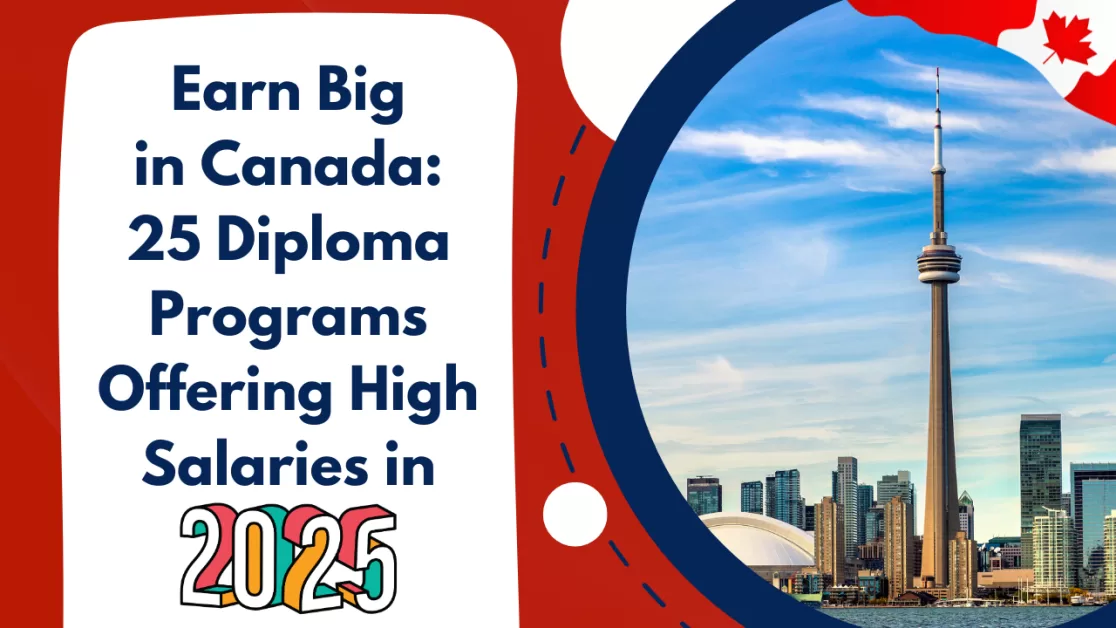
In 2025, Canada’s diploma programs will continue to offer excellent opportunities for individuals looking to enter high-demand fields with competitive salaries. These programs, often completed in 1-2 years, provide practical skills at a lower cost than degree programs, enabling quicker entry into the workforce. Whether you’re a high school graduate, an international student, or a professional seeking to upskill, this comprehensive guide covers 25 high-paying diploma programs across Canada, detailing their career prospects, salary expectations, and common job roles.
Table of Contents
1. Dental Hygiene
- Program Overview: Focuses on preventive dental care and professional practices.
- Length: 2 years
- Salary Range: CAD $60,000 – $80,000
- Career Paths: Dental Hygienist, Public Health Dental Educator
2. Paralegal Studies
- Program Overview: Training in legal research, court procedures, and client management.
- Length: 2 years
- Salary Range: CAD $45,000 – $65,000
- Career Paths: Paralegal, Legal Assistant
3. Medical Laboratory Technology
- Program Overview: Lab testing and diagnostic training for roles in hospitals and clinics.
- Length: 2 years
- Salary Range: CAD $55,000 – $75,000
- Career Paths: Medical Laboratory Technologist, Pathology Assistant
4. Pharmacy Technician
- Program Overview: Focuses on prescription processing and patient care.
- Length: 1-2 years
- Salary Range: CAD $40,000 – $55,000
- Career Paths: Pharmacy Technician, Pharmaceutical Assistant
5. Respiratory Therapy
- Program Overview: Training to provide respiratory support in healthcare settings.
- Length: 2-3 years
- Salary Range: CAD $60,000 – $85,000
- Career Paths: Respiratory Therapist, Pulmonary Function Technologist
6. Electrical Engineering Technician
- Program Overview: Electrical installation and maintenance training across industries.
- Length: 2 years
- Salary Range: CAD $50,000 – $70,000
- Career Paths: Electrical Engineering Technician, Electrical Systems Installer
7. Graphic Design
- Program Overview: Creative skills for careers in advertising and digital media.
- Length: 1-2 years
- Salary Range: CAD $40,000 – $60,000
- Career Paths: Graphic Designer, Digital Illustrator
8. Civil Engineering Technology
- Program Overview: Training in construction planning and project management.
- Length: 2 years
- Salary Range: CAD $50,000 – $80,000
- Career Paths: Civil Engineering Technician, Construction Inspector
9. Web Development
- Program Overview: Covers coding and web design for tech-focused careers.
- Length: 1-2 years
- Salary Range: CAD $55,000 – $75,000
- Career Paths: Web Developer, Front-End Developer
10. Network Engineering
- Program Overview: Networking protocols and cybersecurity training.
- Length: 2 years
- Salary Range: CAD $60,000 – $85,000
- Career Paths: Network Engineer, Systems Administrator
11. Accounting and Payroll Administration
- Program Overview: Training in accounting principles and payroll management.
- Length: 1 year
- Salary Range: CAD $40,000 – $55,000
- Career Paths: Payroll Administrator, Accounting Assistant
12. Early Childhood Education
- Program Overview: Training to work in educational and childcare settings.
- Length: 1-2 years
- Salary Range: CAD $35,000 – $50,000
- Career Paths: Early Childhood Educator, Preschool Teacher
13. Environmental Technology
- Program Overview: Focuses on environmental assessment and sustainability.
- Length: 2 years
- Salary Range: CAD $45,000 – $65,000
- Career Paths: Environmental Technician, Pollution Control Specialist
14. Digital Marketing
- Program Overview: Training in SEO, social media, and content marketing.
- Length: 1 year
- Salary Range: CAD $50,000 – $70,000
- Career Paths: Digital Marketing Specialist, Social Media Manager
15. Culinary Arts
- Program Overview: Equips students for culinary careers as chefs and kitchen managers.
- Length: 1-2 years
- Salary Range: CAD $40,000 – $60,000
- Career Paths: Chef, Kitchen Manager
16. Supply Chain and Logistics
- Program Overview: Training in logistics and inventory control.
- Length: 1-2 years
- Salary Range: CAD $50,000 – $70,000
- Career Paths: Logistics Coordinator, Supply Chain Analyst
17. Software Engineering Technician
- Program Overview: Software development and computer programming training.
- Length: 2 years
- Salary Range: CAD $60,000 – $85,000
- Career Paths: Software Developer, IT Support Specialist
18. Hospitality Management
- Program Overview: Training for careers in hotel and restaurant management.
- Length: 1-2 years
- Salary Range: CAD $45,000 – $60,000
- Career Paths: Hotel Manager, Event Coordinator
19. Business Administration
- Program Overview: Covers finance, HR, and management basics.
- Length: 2 years
- Salary Range: CAD $45,000 – $65,000
- Career Paths: Administrative Assistant, Office Manager
20. Occupational Therapy Assistant
- Program Overview: Assisting in occupational therapy and patient care.
- Length: 2 years
- Salary Range: CAD $50,000 – $70,000
- Career Paths: Occupational Therapy Assistant, Rehabilitation Assistant
21. Cybersecurity
- Program Overview: IT infrastructure protection and security protocol development.
- Length: 1-2 years
- Salary Range: CAD $70,000 – $90,000
- Career Paths: Cybersecurity Analyst, Information Security Specialist
22. Event Management
- Program Overview: Training in event planning and public relations.
- Length: 1 year
- Salary Range: CAD $40,000 – $55,000
- Career Paths: Event Coordinator, Marketing Assistant
23. Mechanical Technician
- Program Overview: Training in machinery maintenance and design.
- Length: 2 years
- Salary Range: CAD $50,000 – $70,000
- Career Paths: Mechanical Technician, Maintenance Technician
24. Aircraft Maintenance
- Program Overview: Prepares students to maintain and repair aircraft.
- Length: 2 years
- Salary Range: CAD $60,000 – $80,000
- Career Paths: Aircraft Maintenance Engineer, Avionics Technician
25. Social Service Worker
- Program Overview: Training in social services and community support.
- Length: 2 years
- Salary Range: CAD $40,000 – $55,000
- Career Paths: Social Service Worker, Case Manager
Why Choose a Diploma Program in Canada?
Diploma programs in Canada are ideal for students seeking affordable, career-focused education. Shorter than bachelor’s degrees, they emphasize practical skills and offer strong employability in Canada’s evolving job market. For more information on educational pathways, check out the Government of Canada’s Education and Training Resources.
Canada’s diploma programs are an excellent choice in 2025 for quick career advancement in high-demand fields.
Ready to explore? Start your visa application today and get one step closer to your adventure!
Don’t let uncertainties hold you back. Our team of expert overseas education consultants is readily available to assist you. Whether you have inquiries about:
- Specific document requirements
- Interview preparation tips
- Visa application timelines
We’re ready to provide personalized guidance tailored to your unique situation. Get in Touch Today at: +919041818122 and begin your journey with Vrinda International.
The information provided in this blog is for general guidance purposes only. Visa policies, application procedures, and fees are subject to change without prior notice. For the most accurate and up-to-date details, we recommend contacting us directly or consulting official sources. Feel free to reach out to us for personalized assistance with your visa application or travel needs.
Frequently Asked Questions (FAQ)
1. Why choose a diploma program over a degree in Canada?
- Diploma programs are generally shorter (1-2 years), more affordable, and often focus on practical skills. They’re designed to prepare students for the workforce faster than traditional degrees, making them ideal for individuals who want to enter high-demand fields quickly.
2. Are Canadian diploma programs recognized internationally?
- Yes, Canadian diplomas are widely recognized and respected around the world, especially in fields like healthcare, technology, and engineering. Canada’s strong educational standards ensure these programs meet industry requirements and provide students with competitive job prospects globally.
3. What are the admission requirements for these diploma programs?
- Admission requirements vary by program and institution. Generally, applicants need to have completed high school (or equivalent), meet English language proficiency standards (for international students), and provide transcripts. Some programs may also require specific courses or tests, such as math or science.
4. Can international students enroll in these high-paying diploma programs?
- Absolutely! Canada is a popular destination for international students, and most diploma programs welcome applications from overseas. International students may also qualify for post-graduation work permits, allowing them to gain work experience in Canada after completing their studies.
5. What are some of the high-paying fields covered by these diploma programs?
- These programs cover a variety of high-paying fields, including healthcare (e.g., Dental Hygiene, Respiratory Therapy), technology (e.g., Cybersecurity, Web Development), engineering (e.g., Electrical Engineering Technician, Civil Engineering Technology), and business (e.g., Accounting, Supply Chain Management).
6. What is the average salary for graduates of these diploma programs?
- Salaries vary by industry and region, but graduates can expect annual earnings between CAD $40,000 and CAD $90,000, depending on their field and level of experience. Fields like cybersecurity, dental hygiene, and respiratory therapy often see higher salaries due to strong demand.
7. Are there co-op or internship options in these diploma programs?
- Many diploma programs in Canada include co-op or internship opportunities, allowing students to gain hands-on experience while studying. This work experience can improve job prospects and provide valuable industry connections.
8. How do I apply to a diploma program in Canada?
- Start by researching programs that interest you and check each institution’s application deadlines and requirements. Most applications are completed online, and you’ll need to submit documents like transcripts, proof of language proficiency, and potentially a statement of intent.
9. Are there financial aid options for diploma students in Canada?
- Yes, many Canadian institutions offer scholarships and bursaries specifically for diploma students. Additionally, international students may qualify for scholarships, and there are also work-study programs and student loans available to help with tuition costs.
10. Can diploma graduates work in Canada after finishing their studies?
- Yes, international graduates of eligible Canadian programs can apply for a Post-Graduation Work Permit (PGWP), which allows them to work in Canada for up to three years. Gaining work experience in Canada can improve career prospects and potentially lead to permanent residency pathways.
11. Do diploma programs offer online or hybrid learning options?
- Some programs offer online or hybrid (online and in-person) learning formats, especially in fields like digital marketing, web development, and business administration. This flexibility can be ideal for students who are working or have other commitments.
12. Are these diploma programs suitable for career changers?
- Definitely! Many diploma programs are designed to equip students with new skills in a relatively short period, making them ideal for career changers. Fields like digital marketing, web development, and supply chain management are particularly popular with individuals looking to switch careers.
13. What are the job prospects like for diploma graduates in 2025?
- Job prospects for diploma graduates in Canada remain strong, especially in healthcare, tech, and engineering. Canada’s labor market is experiencing high demand in these sectors, and many employers actively seek diploma graduates due to their practical training and skills.
14. How long does it take to complete a high-paying diploma program in Canada?
- Most of these diploma programs take between 1-2 years to complete. Programs in fields requiring extensive practical training, like medical lab technology or respiratory therapy, may take up to three years.
15. Is it possible to continue to a degree program after completing a diploma?
- Yes, many colleges and universities in Canada have pathways that allow diploma graduates to transfer credits toward a bachelor’s degree. This pathway can save time and money while giving graduates the option to pursue further education.

